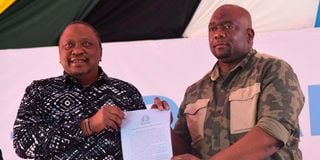Congo peace efforts and per diem saga

Former President Uhuru Kenyatta (left) and Serge Tshibangu Nzenza, special envoy and advisor to the President of the Democratic Republic of Congo displaying an agreement during the East African Community-led Nairobi Process at Safaripark hotel in Nairobi on December 6, 2022.
On Tuesday, what has to be the photograph of the day showed a distressed former Kenya president Uhuru Kenyatta, who is the East African Community facilitator for the Democratic Republic of Congo peace process, working his mobile phone frantically.
It turns out the progress at the third meetings of the DRC-Nairobi peace process had been delayed by the small (or, as it turned out, quite big) matter for the hundreds of Congolese who are gathered in Nairobi to find peace for the mineral-rich eastern part of the country. Some people, it is not clear who, had “eaten” some of the money, and unpaid Congolese were on some peace strike.
Significant fighting flared up in the region recently after the March 23 (M23), now the leading dissident group in eastern DRC, returned to war, accusing Kinshasa of failing to honour the terms of a 2013 deal under which they gave up their arms.
The way M23 tells it, they were instead rounded up and slaughtered. A clearly well-reorganised and motivated M23 has emerged from those ashes.
With the DRC joining the EAC as the seventh member in April, the bloc’s leaders agreed to dispatch troops for another effort to stabilise the region, dubbed the East African Regional Force (EACRF).
Rwanda has not sent troops because Kinshasa argues it’s close to M23, who comprise mainly the Tutsi of Congo, and are part of the central and east peoples who speak Kinyarwanda, who are called “Rwandaphones”. DRC President Felix Tshisekedi has been accusing Rwanda of militarily backing M23, a charge which has been met with strong denials from Kigali.
The DRC Nairobi process, and the issue of allowances, will be all too familiar to people who have followed the country’s previous encounters with peace talks. It is strange that outsiders have to pay people to work on bringing peace to their country.
A Congolese tantrum over per diem would exemplify “everything that is wrong with Africa, to use the trope. That could be a dangerous oversimplification. We must go back to the South African gambling Sun City resort, 203 kilometres from the country’s commercial capital Johannesburg.
In 1997, a consortium of African countries, majorly Rwanda and, to a lesser extent, Uganda, helped rebels overthrow the corrupt DRC (then Zaire) dictator Mobutu Sese Seko. Several other countries, including Angola, Zimbabwe, South Africa, Ethiopia, Eritrea and Zambia, backed the main rebel group led by Laurent Kabila, who was to be succeeded by his son, Joseph Kabila, following his assassination in Kinshasa on January 16, 2001.
Kabila Senior
By that time, Kabila Senior had long fallen out with his main backers, Rwanda and Uganda. The two countries left DRC but were drawn back into its volatile eastern regions as groups opposed to them assembled there, and they backed several rebel groups against the government in Kinshasa. Uganda and Rwanda lined up on one side against their former anti-Mobutu allies Angola, Zimbabwe, and South Africa, who were backing Kabila.
In 2002, international pressure and shifting geopolitical interests of the African governments who were embroiled in the eastern DRC led to an agreement to hold peace.
Some genius came up with the idea to have them in Sun City, presumably because it was away from the madding crowds in Johannesburg. It was like taking talks to Las Vegas. Many Congolese delegates got lost in the tabling tables of Sun City, its bars, and the bosoms of its women. As is happening in Nairobi today, the issue of keeping them supplied with allowances was critical.
Critics say the Sun City venue led to delays as the combatants didn’t want to end their joyful sinning. To the Congolese, though, it was a much-needed relief from the bleakness of conflict.
The talks, nevertheless, progressed, and in early 2003 they entered crunch time. In the last few days, the agreement had been reached on all issues except one or two niggling ones.
One day the various stakeholders decided that the Congolese needed to break and resolve the issues among themselves without outsiders.
The world waited for them to return. They didn’t. The clock ticked on and on. After a long time, fearing the Congolese might have disagreed violently and killed themselves in a fight, it was decided to send a Ugandan brigadier, Noble Mayombo, to go and check what was going on. Mayombo had been Uganda President Yoweri Museveni’s point man in DRC and had close links to many rebel leaders.
When Mayombo entered the room, he was stunned. The Congolese weren’t even in talks. They had formed a circle and were playing phantom instruments, singing classic Congolese soukous hits by greats like Franco, and dancing away. Mayombo slinked away, humbled.
Left alone, the Congolese had thrown aside their differences and sang and danced to the best of their land. In a complex and twisted way, like the singing and dance circle in Sun City, skirmishes over per diem at peace conferences for their country in foreign capitals could be the Congolese showing outsiders the middle finger.
Mr Onyango-Obbo is a journalist, writer and curator of the ‘Wall of Great Africans’. @cobbo3





